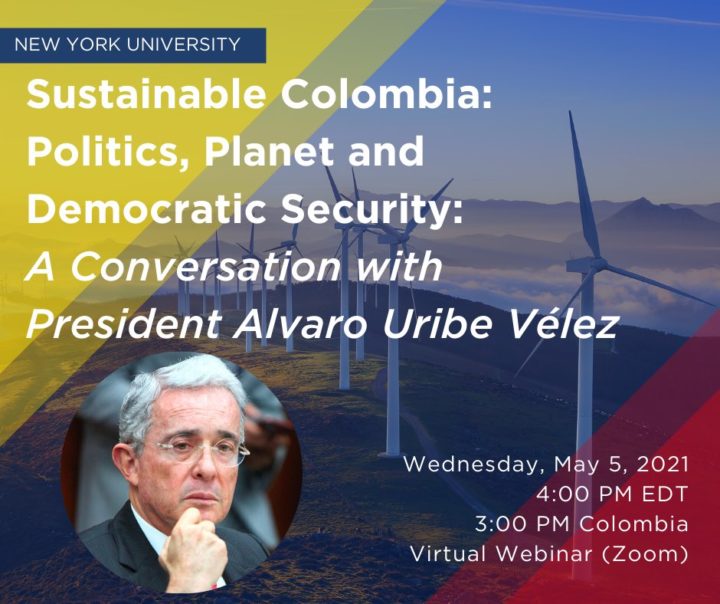As students, professors, researchers and human rights activists, alumni, we strongly oppose this invitation for former president Alvaro Uribe to engage in this academic webinar. As a known violator to human rights and environmental rights, Uribe is a questionable person to be leading a conversation on environmental sustainability. The policies implemented during his administration as president which have been reinstated during the current presidential administration led by the same party, are inconsistent with the goals of sustainable development. In fact, his extractivist policies have achieved severe environmental degradation, forced displacement, loss of human life. We are alarmed by the aims of the conversation to extrapolate these actions to other regions and programs. We declare that Uribe is unfit to lead a discussion about sustainability, environmental security, nor democracy. We demand that this event be cancelled unless amore suitable speaker of authority on sustainable development can replace his seat.
During the two administrations of former President Uribe and under his “democratic security” policy, he promoted multiple extractive projects. Those projects were not sustainable or positive for the environment. On the contrary, as multiple academic investigations have shown and that the Brademas center omits, many of these projects generated severe impacts on biodiversity and the ecosystem of the territories. Also, due to their authoritarian essence, they caused massive violations of the human rights of peoples. Indigenous, Afro-descendant, and peasant communities that fight for the protection and care of their territories. The situation of Indigenous peoples, Afro-descendants, and peasants was so dramatic that the Constitutional Court of Colombia promulgated specific decisions that sought the protection of these communities in the face of the destruction of their territories by Uribe’s administration. Thus, it is important to note that at this time, former President Uribe is undergoing proceedings for the commission of crimes against humanity in Colombia and complaints before the international criminal court for 6,402 false positives committed during his administration between 2002 – 2010.
During his government, families and entire communities were affected by the expansion of extractive industries. They were displaced from their territories and confined by the growing body of armed actors. These populations were forced to move to urban centers and municipal capitals where they live in conditions of poverty, with limited access to essential services and, to a lesser extent, to justice and reparation. Data from the Registro Unico de Víctimas show that of the more than 9 million victims of the armed conflict in Colombia, 8,116,483 are victims of forced displacement. Half of these figures (4,094,127) correspond to people who had to move from their territories and communities during – and as a consequence of – the democratic security policy (2002-2010).
Also, by granting generous tax exemptions to multinational corporations, Uribe’s administration encouraged the exploitation of mining resources in Colombia, leading to devastating effects on the country’s natural ecosystems. During his government, the total area of land with mining titles went from 1.13 million hectares to 8.53 million hectares. In total, Uribe granted 7,869 mining titles. A large part of these hectares were located in fragile paramo ecosystems and in National Natural Parks. The open pit mining operations that have been allowed to expand under Uribe’s administration have caused nearly irreparable damage to the ecosystems and incurred a tremendous loss of ecosystem services. These operations have drastically modified the landscape, cut down hundreds of hectares of trees, displaced hundreds of animal species and contaminated water sources by their use of cyanide and mercury.
Additionally, agroindustrial policies that favor large-scale monoculture directly threaten Colombia’s biodiversity and contaminate rivers, streams and essential water sources due to areal spraying practices. This practice has been discussed by the current administration to reactivate the governmental program to eradicate illicit crops by aerial spraying the herbicide glyphosate.
The Uribe administration did not contribute to sustainability or democracy in Colombia. In fact, during his government, he merged the Ministry of Environment with the Ministry of Housing. This action shows the lack of interest in environmental issues. It also shows a vision of using the territory solely for resource extraction in the years that he was in power that continues today. On the other hand, the dominant position of his and his party against the peace process with the FARC does not contribute to the social sustainability of the country.
Finally, we consider that the event is organized in a way that does not encourage dialogue nor civil debate. Uribe already has multiple channels to spread his predatory policies on the environment and peace in Colombia. We believe that the university forum should not be the space to echo a single perspective. We believe that for there to be a respectful dialogue from the academy, it is necessary to maintain a balance in viewpoints when selecting guests to a panel. The conversation currently features a highly polarized panelist who was asked to “share his journey and insights in pursuit of citizen and environmental security,” when his record clearly shows this journey to be one against citizen and environmental security. With concern, we note the absence of other voices. This goes against the NYU John Brademas Center mission to “ensure that opinions and ideas on these issues are expressed, debated, and formulated for action.” We demand that the voices of those who have been affected by the extractive policies headed by Uribe and his administration and that of the Centro Democrático be included in this event.
Signers list: Link






